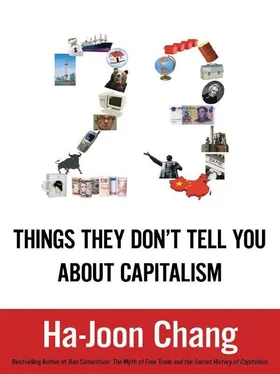Only when we are free to question the hand of cards that the market has dealt us will we be able to find ways to establish a more just society. We can, and should, change the rules of the stock market and the corporate governance system in order to restrain excessive executive pay in limited liability companies. We should not only provide equal opportunity but also equalize, to an extent, the starting points for all children for a truly meritocratic society. People should be given a real, not superficial, second chance through unemployment benefits and publicly subsidized retraining. Poor people in poor countries should not be blamed for their poverty, when the bigger explanations lie in the poverty of their national economic systems and immigration control in the rich countries. Market outcomes are not ‘natural’ phenomena. They can be changed.
Fifth: we need to take ‘making things’ more seriously .The post-industrial knowledge economy is a myth. The manufacturing sector remains vital.
Especially in the US and the UK, but also in many other countries, industrial decline in the last few decades has been treated as an inevitability of a post-industrial age, if not actively welcomed as a sign of post-industrial success.
But we are material beings and cannot live on ideas, however great the knowledge economy may sound. Moreover, we have always lived in a knowledge economy in the sense that it has always been a command over superior knowledge, rather than the physical nature of activities, that has ultimately decided which country is rich or poor. Indeed, most societies are still making more and more things. It is mainly because those who make things have become so much more productive that things have become cheaper, in relative terms, than services that we think we don’t consume as many things as before.
Unless you are a tiny tax haven (a status that is going to become more and more difficult to maintain, following the 2008 crisis), such as Luxemburg and Monaco, or a small country floating on oil, such as Brunei or Kuwait, you have to become better at making things in order to raise your living standard. Switzerland and Singapore, which are often touted as post-industrial success stories, are in fact two of the most industrialized economies in the world. Moreover, most high-value services are dependent (sometimes even parasitic) on the manufacturing sector (e.g., finance, technical consulting). And services are not very tradable, so an overly large service sector makes your balance of payments situation more precarious and thus your economic growth more difficult to sustain.
The myth of the post-industrial knowledge economy has also misdirected our investments. It has encouraged excessive emphasis on, for example, formal education, whose impact on economic growth turns out to be highly complex and uncertain, and on the spread of the internet, whose productivity impacts are actually quite modest.
Investment in ‘boring’ things like machinery, infrastructure and worker training needs to be encouraged through appropriate changes in tax rules (e.g., accelerated depreciation for machinery), subsidies (e.g., to worker training) or public investment (e.g., redirection into infrastructural development). Industrial policy needs to be redesigned to promote key manufacturing sectors with high scope for productivity growth.
Sixth: we need to strike a better balance between finance and ‘real’ activities .
A productive modern economy cannot exist without a healthy financial sector. Finance plays, among other things, the crucial role of resolving the mismatch between the act of investment and the bearing of its fruits. By ‘liquidizing’ physical assets whose characteristics cannot be changed quickly, finance also helps us to reallocate resources quickly.
However, in the last three decades, finance has become the proverbial tail that wags the dog. Financial liberalization has made it easier for money to move around, even across national borders, allowing financial investors to become more impatient for instant results. As a consequence, both corporations and governments have been forced to implement policies that produce quick profits, regardless of their long-term implications. Financial investors have utilized their greater mobility as a bargaining chip in extracting a bigger share of national income. Easier movement of finance has also resulted in greater financial instability and greater job insecurity (which is needed for delivering quick profits).
Finance needs to be slowed down. Not to put us back to the days of debtors’ prison and small workshops financed by personal savings. But, unless we vastly reduce the speed gap between finance and the real economy, we will not encourage long-term investment and real growth, because productive investments often take a long time to bear fruit. It took Japan forty years of protection and government subsidies before its automobile industry could be an international success, even at the lower end of the market. It took Nokia seventeen years before it made any profit in the electronics business, where it is one of the world leaders today. However, following the increasing degree of financial deregulation, the world has operated with increasingly shorter time horizons.
Financial transaction taxes, restrictions on cross-border movement of capital (especially movements in and out of developing countries), greater restrictions on mergers and acquisitions are some of the measures that will slow down finance to the speed at which it helps, rather than weakens or even derails, the real economy.
Seventh: government needs to become bigger and more active .
In the last three decades, we have been constantly told by free-market ideologues that the government is part of the problem, not a solution to the ills of our society. True, there are instances of government failure – sometimes spectacular ones – but markets and corporations fail too and, more importantly, there are many examples of impressive government success. The role of the government needs to be thoroughly reassessed.
This is not just about crisis management, evident since 2008, even in the avowedly free-market economies, such as the US. It is more about creating a prosperous, equitable and stable society. Despite its limitations and despite numerous attempts to weaken it, democratic government is, at least so far, the best vehicle we have for reconciling conflicting demands in our society and, more importantly, improving our collective well-being. In considering how we can make the best out of the government, we need to abandon some of the standard ‘trade-offs’ bandied about by free-market economists.
We have been told that a big government, which collects high income taxes from the wealthy and redistributes them to the poor, is bad for growth, as it discourages wealth creation by the rich and makes lower classes lazy. However, if having a small government is good for economic growth, many developing countries that have such a government should do well. Evidently this is not the case. At the same time, the Scandinavian examples, where a large welfare state has coexisted with (or even encouraged) good growth performance, should also expose the limits to the belief that smaller governments are always better for growth.
Free-market economists have also told us that active (or intrusive, as they put it) governments are bad for economic growth. However, contrary to common perception, virtually all of today’s rich countries used government intervention to get rich (if you are still not convinced about this point, see my earlier book, Bad Samaritans ). If designed and implemented appropriately, government intervention can increase economic dynamism by augmenting the supply of inputs that markets are bad at supplying (e.g., R&D, worker training), sharing risk for projects with high social returns but low private returns, and, in developing countries, providing the space in which nascent firms in ‘infant’ industries can develop their productive capabilities.
Читать дальше






![Ally Carter - [Gallagher Girls 01] I'd Tell You I Love You But Then I'd Have to Kill You](/books/262179/ally-carter-gallagher-girls-01-i-d-tell-you-i-lo-thumb.webp)





